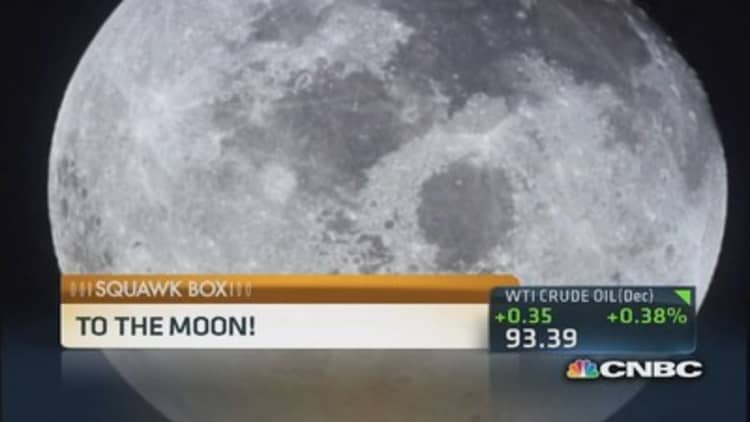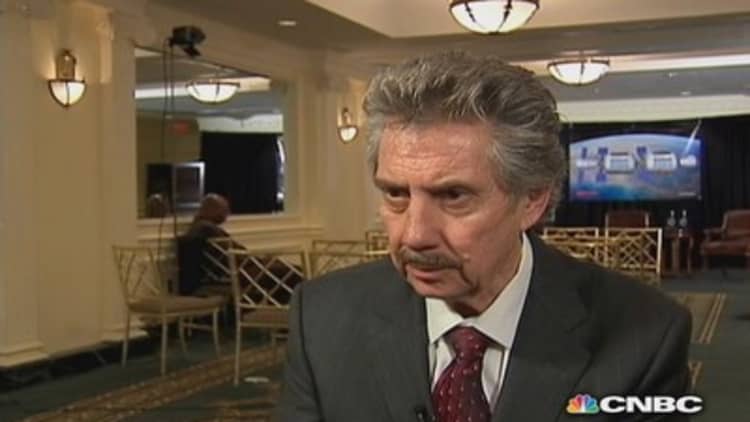
NASA is in the middle of jettisoning its old business model. The U.S. space agency is trying to figure out what kinds of products and services it should buy "off the shelf" from companies like SpaceX, and how much should it invest in its own development in order to push American discovery to the next level.
Robert Bigelow thinks a happy medium can be found. The founder of Bigelow Aerospace made a fortune in the hotel and real estate businesses, and he's pouring hundreds of millions of dollars into an enterprise that will create inflatable habitats designed for life beyond Earth. He entered into an agreement with NASA to provide a report on how ventures like his could help NASA get back to the moon, and even Mars, faster and cheaper.
The catch? It needs to be worth his while.
Bigelow is applying to the Federal Aviation Administration's Office of Commercial Space Transportation to amend a 1967 international agreement on the moon so that a system of private property rights can be established there. "When there isn't law and order," he said, "there's chaos."
Bigelow said he believes the right to own what one discovers on the moon is the incentive needed for private enterprise to commit massive amounts of capital and risk lives. "It provides a foundational security to investors," he said.
Bigelow does not feel that any one nation should own the moon.
"No one 'anything' should own the moon," he said. "But, yes, multiple entities, groups, individuals, yes, they should have the opportunity to own the moon."
The earth's natural satellite could hold vast amounts of valuable minerals, but mining isn't what Bigelow has in mind for himself. He wants to provide housing for those who go there. And he wants the United States to go there before China.
"The big danger here isn't a fear of private enterprise owning and maximizing profitable benefit from the moon," he said. "The big worry is America is asleep and does nothing, while China comes along, lands people on the Moon, and decides, 'We might as well start surveying and laying claim, because who is going to stop us?'"
China is planning to launch a lunar rover soon, and it could land a manned mission within a dozen years. "They aren't going there for footprints and flags," Bigelow said.
Does the possibility of China beating America back to the Moon worry him? "A lot. ... Tell me something that they don't have significant interest in," he replied. "Name something."

The 1967 international Outer Space Treaty forbids the use of the moon for military purposes, though the State Department indicates China did not sign off on the it until 1983.
Bigelow is concerned that if the Chinese get to the moon before the U.S. returns, China will have a leg up on getting to Mars.
"It's the psychological impact that has the value, of every soul looking at the moon and knowing that it belongs to China," he said. "I think that's something the United States would not recover from for hundreds of years."
While China may be working toward a manned mission to the Moon by 2025, Bigelow hopes he can help NASA establish a lunar base sooner, though he said that depends on a lot going right. He's delayed manufacturing and signing contracts with customers until he can be guaranteed transport.
Meanwhile, one Bigelow Aerospace habitat will be flown to the International Space Station on a SpaceX rocket in 2015 for testing. At a news conference Tuesday with Bill Gerstenmaier, NASA's head of Human Exploration, both sides agreed they need each other: NASA needs the low-cost, fast moving expertise of private ventures, while companies like Bigelow Aerospace need a core customer to get these businesses off the ground, literally.
How confident is Robert Bigelow that he can eventually get his products to the moon and make money doing it?
"We may never do either," he said, "but we're going to try."
—By CNBC's Jane Wells. Follow her on Twitter: @janewells

